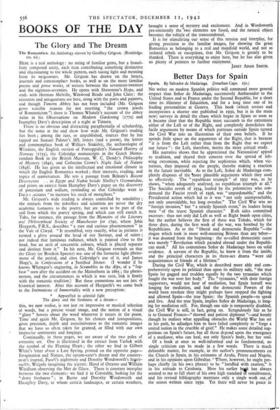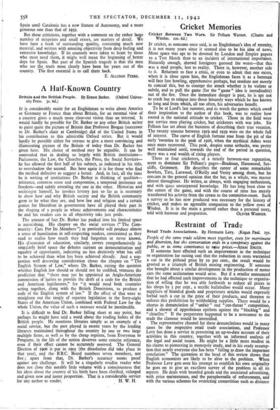Better Days for Spain:
Spain. By Salvador de Madariaga. (Jonathan Cape. 25s.) No writer on modern Spanish politics will command more general respect than Senor de Madariaga, successively Ambassador to the United States and to France under the Second Republic, for a short time its Minister of Education, and for a long time one of its leading personalities at Geneva. This book (which revises and incorporates a shorter one published in 1930, but is in the main new) surveys in detail the chaos which began in Spain so soon as it became clear that the Republic must succumb to the extremists either of the Left or of the Right, and completely demolishes the facile arguments by means of which partisans outside Spain turned the Civil War into an illustration of their own beliefs. If he spends little space an the arguments of the Right, that is because "it is from the Left rather than from the Right that we expect our future ": the Left, therefore, merits the more critical study.
His narrative shows that he appreciated the Nationalists' appeal to tradition, and shared their concern over the spread of left- wing extremism, while rejecting the sophistries which, when vic- torious' they imposed on the people, thereby making a reaction in the future inevitable. As to the Left, Senor de Madariaga com- pletely disposes of the %lore plausible arguments which they used so effectively. The "republican triumph" of 1931 was, as he shows, "when adequately analysed, no republican triumph at all." The Socialist revolt of 1934, lauded by the polemicists who con- demned the Fascist revolt of 1936, was "unpardonable," and the Presidential action which led to it was "not only unimpeachable, not only unavoidable, but long overdue." The Civil War was no "foreign invasion," but "a strictly Spanish event," its leaders being men "-of the truest Spanish character." ILth sides committed excesses : thus not only did Left as well as Right bomb open cities, but the author believes the first of these was Toledo, which for three days, during the first week of the war, was bombed by the Republicans. As to the "liberal and democratic Republic "—the slogan which took in more well-meaning Britons than any bther- it was doomed from the beginning: the so-called democratic cause was merely "Revolution which paraded abroad under the Republi- can mask." All his contentions Senor de Madariaga bases on solid evidence. A servant of the Republic, he knew it from the inside, and the principal characters in its three-act drama "were old acquaintances or friends of a lifetime."
During the Civil War, which is described more ably and com- prehensively upon its political than upon its military side, "the true Spain lay gagged and trodden equally by the two tyrannies which fought the war over her body." The tyrannies," with their foreign supporters, would not hear of mediation, but Spain herself was longing for mediation and had the democratic Powers of the world been resolute they Might perhaps have stopped the fighting and allowed Spain—the true Spain: the Spanish people—to speak and live. And the true Spain implies Senor de Madariaga, is long- ing fnr mediation still. For, tough one side is temporarily disabled, the Civil War is still, in fact, going on. Scrupulously fair as he is to General Franco—" shrewd and patient diplomat "—and keenly though he realises what appalling obstacles the World War has set in his path, he adjudges him to have failed completely to "forge a united nation in the crucible of grief." He makes some detailed sug- gestions on Spain's future, but all these depend upon the emergence of a mediator, who can heal, not only Spain's body, but her soul.
Of a book at once so well-informed and so fundamental, no single criticism can be made in a few words. There is much debatable matter, for example, in the author's pronouncements on the Church in Spain, in his estimates of Azaiia, Prieto and Negrin, and in his opinions upon Gibraltar. " Where, however, he ought per- haps chiefly (in his own phrase) to be "handled with caution," is in his attitude to Catalonia. Here his earlierhas always seemed to me to fall short of his own high standard i51 sensitiveness, and his revised bibliography mentions only a single work out,of the scores written since 1930. Yet there will never be peace in Spain until Catalonia has a new Statute of Autonomy, and a more generous one than that of 1932.
But these criticisms, together with a comment on the rather large number of misprints and small errors, are matters of detail. We have here a book of outstanding quality, containing much new material, and written with amazing objectivity from deep feeling and extensive knowledge. If its counsels were taken to heart by those who most need them, it might well mean the beginning of.better days for Spain. But part of the Spanish tragedy is that the men who see the truth most clearly have been for years out of the country. The first essential is to call them back.
E. ALLISON PEERS.



























 Previous page
Previous page